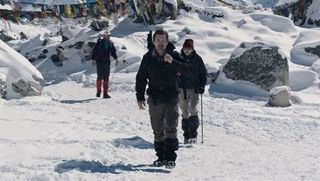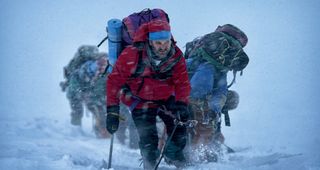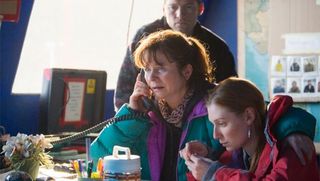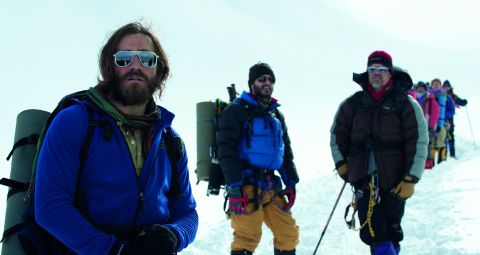Mountain tension…
“Everest is another beast,” we are told early on in Baltasar Kormákur’s true-life tale, the first of many warning shots fired. Majestic yet unforgiving, the world’s highest mountain really does seem like a wild animal that can never be tamed. Still, tell that to those who’ve ever conquered the summit – an adventure that requires determination, stamina and resilience.
Scripted by William Nicholson (Gladiator) and Simon Beaufoy, Everest sets out to retrace the fateful events in May 1996 when two expedition groups were caught in the path of a violent storm. Part tragedy, part miracle, it’s a survival story that arrives in the wake of All Is Lost and 127 Hours (which Beaufoy co-wrote), with themes of bravery, loyalty, ingenuity and courage looming almost as large as Everest itself.
It’s set at a time when ascending the mountain had become a mini-industry, with clients paying hefty fees to join a professional climber and his crew to attempt the near-impossible. One of the most successful companies in this field was the New Zealand outfit Adventure Consultants, co-formed by Rob Hall (played here by Jason Clarke), the Kiwi climber who had already led 19 others to the summit.

Leaving his pregnant wife Jan (Keira Knightley) back in Christchurch, New Zealand, with the words “be back for the birth” ringing in his ears, Hall sets off for another ascent. Joining him are a party including cocksure Texan Beck Weathers (Josh Brolin), Seattle mailman Doug Hansen (John Hawkes), who got close to making the summit a year earlier, and Jon Krakauer (Michael Kelly), a journalist writing a feature on Hall and his team.
Yet the Adventure Consultants are hardly alone on the mountain. At a base camp seemingly busier than Piccadilly Circus at rush hour, there are some 20 different teams attempting to climb Everest in the same time period. Leading one rival outfit, Mountain Madness, is Scott Fischer (Jake Gyllenhaal), a big-bearded, pony-tailed adrenaline junkie who looks like he’d be more at home surfing waves at Venice Beach.
Of course, scaling Everest is not something that can be done in a day, as Kormákur painstakingly shows. It takes several partial ascents for the body to acclimatise before a final push can be made; as we’re told in no uncertain terms, a human is not meant to function at the cruising height of a 747 – or “the Death Zone”, as they term it. A portent of doom? With characters coughing up blood or gasping for oxygen, there’s no doubt this is one of the riskiest pursuits in the world.

Oddly, it’s these early scenes that are the most compelling. From a mini-avalanche to Beck almost falling from a ladder shakily placed across one of the gulp-inducing crevasses, Kormákur skillfully opens up a world that many of us have never experienced. Shot in stomach-knotting 3D, it has the same white-knuckle intensity as Alfonso Cuarón’s Gravity. Placing you firmly on the mountain, the film makes you feel the vertigo, the rush of blood to the head.
Kormákur makes little attempt to explore the psychology of this group, though. At base camp, Krakauer asks: “Why climb Everest?” The resounding answer from all is simply: “Because it’s there.” This stubborn quality may be essential to any climber, but it hardly adds a layer of complexity to any of the characters. Rather like the glimpses we see of Knightley’s pensive spouse or of Robin Wright (as Beck’s wife Peach), insight is all too brief.
Everest’s problems really lie in its second half, when events conspire against the climbers. While the storm and the body-numbing temperatures are the ultimate killers, Kormákur also takes care to catalogue the mistakes that occur in the countdown to disaster. There’s the missing ropes and oxygen tanks – and the mountaineers’ wilful determination to make it to the summit even after the so-called ‘turnaround time’, the safety cut-off point when the climbers need to head back.

Credit to the actors, who are all fully committed, though it’s Emily Watson, as base-camp manager Helen Wilton, who arguably walks away with the acting honours. The film’s emotional anchor, she performs a vital act of assistance in the finale – and there’s an impressive acting masterclass to be seen in Watson’s stricken face. Yet, in truth, Kormákur never quite earns the same reaction from viewers.
With a cast that also includes Sam Worthington as Rob’s fellow climber Guy Cotter and The Man From U.N.C.L.E.’s Elizabeth Debicki as the team doctor Caroline Mackenzie, Everest doesn’t want for familiar faces. But with so many characters vying for attention, it’s hard to feel much for any one individual, with the exception of Clarke’s unflappable Hall. Perhaps the real star is Everest itself. As we’re told: “The last word belongs to the mountain.”

